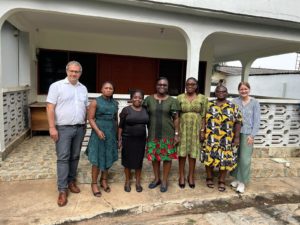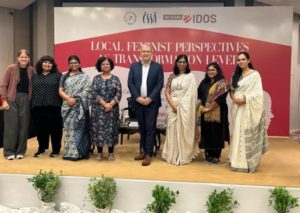The workshops explored gender norms and local feminist perspectives on gender equality. The teams also developed initial recommendations for political actors at various governance levels to further promote gender equality.

Copyright: IDOS
In the context of the project ‘Local feminist perspectives as transformation levers’, Prof. Stephan Klingebiel and Jacqueline Götze have visited IDOS’ partner organisations, the Gender Studies and Human Rights Documentation Centre (GSHRDC) in Accra and the Goa Institute of Management (GIM) in Delhi to conduct the interim workshops.
The objective of the interim workshops was for the colleagues of the different teams and IDOS to meet in person and exchange ideas and concepts with relevance to the project’s topics and questions. The workshops have provided space for the teams from Ghana and India to present preliminary findings from the research they have already conducted, to share general feedback on the study’s (conceptual) frameworks and discuss open questions. Further, the workshop gave the team at IDOS the opportunity to share preliminary ideas for the structure of the synthesis study to get feedback from the teams from Ghana and India. More generally, the workshop facilitated conceptual discussions on the project’s overall contributions to debates on feminisms, the role of gender norms and local feminist perspectives to transformations towards gender equality. On a more practical level, the teams also used the workshop to develop jointly first recommendations for political actors on different governance levels with view to gender equality. In this way, the workshops linked international debates to national, regional and local discussions around feminist approaches to development.
In Delhi, the team of the partner organisation, Sreerupa Sengupta, Divya Singhal and Ananya Chakraborty, have organised a stakeholder dialogue back-to-back with the interim workshop. They have invited around 40 stakeholders to reflect on preliminary findings and to facilitate a broader discussion about issues around gender equality and local feminisms in India.

Copyright: IDOS
During their time in Accra and Delhi, the IDOS team was further able to talk and exchange with other actors from civil society, the German development cooperation sector and the German Embassies about current challenges and opportunities of gender equality and feminist approaches.
The overall project’s objective is to address existing knowledge gaps on local feminist perspectives at different levels and in diverse contexts to analyse their potential as transformation levers towards greater gender equality. IDOS works together with three partner organisations: In cooperation with the Gender Studies and Human Rights Documentation Centre (Ghana), the Goa Institute of Management (India) and Gender in Detail (Ukraine), this project explores the potential of local feminist perspectives to act as levers for transformative change for greater gender equality and sustainable development in Ghana, India and Ukraine.

Schreibe einen Kommentar